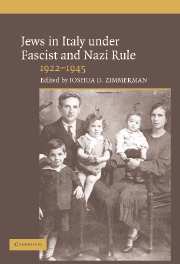Book contents
- Frontmatter
- Contents
- Acknowledgments
- Abbreviations
- List of Contributors
- Map 1. The Jews of Italy, 1938
- Map 2. Principal Centers of Anti-Jewish Persecution, 1938–1943
- Introduction
- Part One ITALIAN JEWRY FROM LIBERALISM TO FASCISM
- Part Two RISE OF RACIAL PERSECUTIONS
- Part Three CATASTROPHE – THE GERMAN OCCUPATION, 1943–1945
- Part Four THE VATICAN AND THE HOLOCAUST IN ITALY
- Part Five AFTERMATH: CONTEMPORARY ITALY AND HOLOCAUST MEMORY
- 16 The Rescued and the Rescuers in Private and Public Memories
- 17 Return of the Repressed: Italian Film and Holocaust Memory
- 18 The Secret Histories of Roberto Benigni's Life Is Beautiful
- Index
- Plates A–D
16 - The Rescued and the Rescuers in Private and Public Memories
Published online by Cambridge University Press: 22 September 2009
- Frontmatter
- Contents
- Acknowledgments
- Abbreviations
- List of Contributors
- Map 1. The Jews of Italy, 1938
- Map 2. Principal Centers of Anti-Jewish Persecution, 1938–1943
- Introduction
- Part One ITALIAN JEWRY FROM LIBERALISM TO FASCISM
- Part Two RISE OF RACIAL PERSECUTIONS
- Part Three CATASTROPHE – THE GERMAN OCCUPATION, 1943–1945
- Part Four THE VATICAN AND THE HOLOCAUST IN ITALY
- Part Five AFTERMATH: CONTEMPORARY ITALY AND HOLOCAUST MEMORY
- 16 The Rescued and the Rescuers in Private and Public Memories
- 17 Return of the Repressed: Italian Film and Holocaust Memory
- 18 The Secret Histories of Roberto Benigni's Life Is Beautiful
- Index
- Plates A–D
Summary
Some time ago a friend and colleague, Anna Segre, requested that Yad Vashem in Jerusalem bestow the title of Righteous Among the Nations upon a medical doctor from Turin, Carlo Angela, for saving her parents, Renzo and Nella. This event is the starting point from which I will attempt to illustrate the relations between public and private memory and the “battle of memories” that was waged in Italy around the official ceremony in which the title was awarded.
In some ways this battle resembles the one witnessed in some European countries in the postwar period. The clash was especially marked in France where there was a tendency to assimilate all prisoners of concentration camps into the category of political deportees. This position was a natural one for those who had been politically active, or had been partisans, and also for those who had been politicized within the concentration camps. However, for many others, blurring the distinction between deportee and political prisoner tended to obscure the specific histories of individuals and groups. The camps also contained people taken as hostages, those captured in reprisals and punitive raids, people accused of black market trading, soldiers convicted of military offenses, and “free workers” taken to the camps as a punishment. On arrival at the camps, all these people were in fact classed as red triangles, that is, as political prisoners, not because they had been arrested for a political offense, but because they were categorized as saboteurs and enemies of the Third Reich.
- Type
- Chapter
- Information
- Jews in Italy under Fascist and Nazi Rule, 1922–1945 , pp. 311 - 320Publisher: Cambridge University PressPrint publication year: 2005



